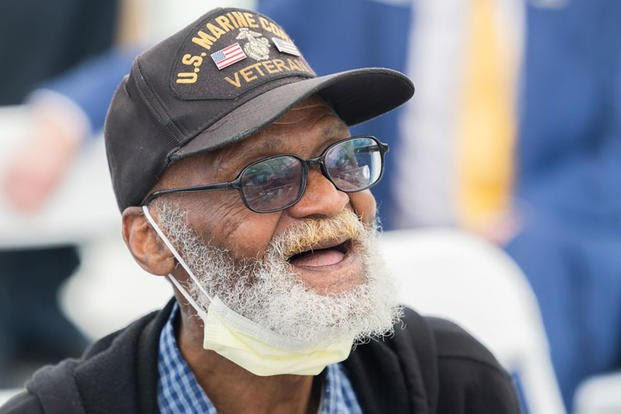PACT Act Keeps Faith with Health Needs of America’s Veterans
Albert Hill, a U.S. Marine Corp veteran, listens to U.S. Rep. Richard E. Neal highlighting the passage of the PACT Act at Springfield VA Clinic on Bond Street.
Veterans of the armed services need to know this. Everyone else will want to know.
In recent months, provisions of a new law, the PACT Act, have been expanding essential and long-delayed medical coverage for veterans.
The law represents the largest expansion of veterans’ health care in generations. It covers exposures to toxins and other chemicals that the U.S. government has been slow to acknowledge routinely resulted in injury.
For years, veterans who believed their health problems stemmed from exposure during their military service have had to prove they are right – and the government is wrong
That’s been an unfair deal of the cards for people who served the nation.
Now, veterans receiving care from the Veterans Administration are eligible for free screenings that assess their exposure to toxins while in uniform. What’s more, the law, formally called the Promise to Address Comprehensive Toxics Act, rights the imbalance in how veterans establish that the government should help them do all it can to regain health. The measure won bipartisan support in Congress and was signed into law last August.
Twenty new medical conditions that bedevil veterans are now “presumed” to be service-related. The coverage is expected to reach as many as 5 million veterans. To learn more, veterans should contact veterans’ agents in their home communities.
At a recent gathering at the VA clinic on Bond Street in Springfield, Gumersindo Gomez, executive director of the Bilingual Veterans Outreach Centers of Massachusetts, underscored the importance of that change. No longer are veterans required to assemble stacks of paperwork and engage in long bureaucratic battles to get help.
Local veterans’ agents say they are busy helping people obtain the expanded benefits under the PACT Act. Gomez said the other day that one veteran he worked with was able to qualify for 100% disability status because of the newly recognized conditions. “It wouldn’t have happened without this law,” he said at the gathering, hosted by U.S. Rep. Richard Neal, D- Springfield.
Neal plans additional events to get the word out to veterans and their families in the 1st Congressional District. A staffer in his office, Michelle Brown, is assisting that effort.
The law came late for veterans exposed to things like Agent Orange and toxic smoke from burn pits, from the Vietnam era all the way through conflicts after 9-11. But late is better than never.



